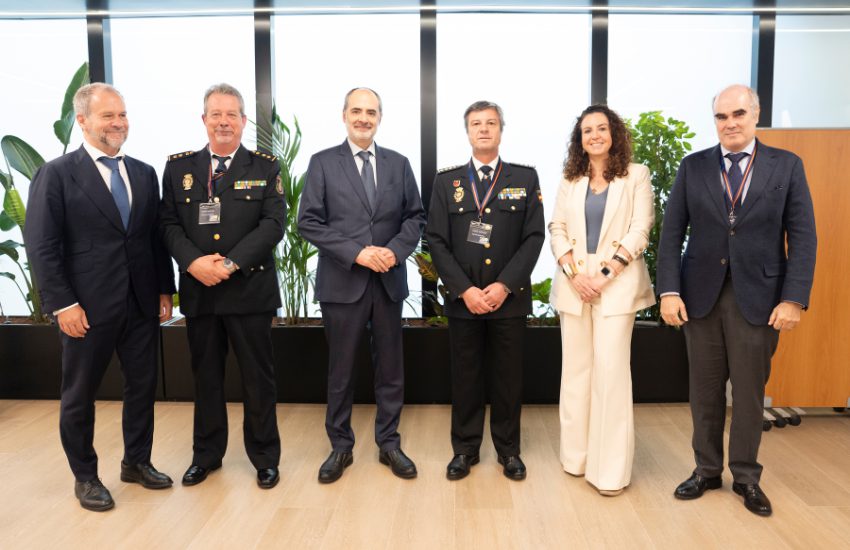2nd "Public-Private Collaboration in the Fight against the Financing of Terrorism and Radicalism" Congress
The conference, held in Madrid this morning, featured presentations by various experts in preventing and fighting against the financing of terrorism and radicalism
The event, which was attended by 200 specialists in preventing the financing of terrorism, was organised by the General Intelligence Office as part of its commitment to investigate and neutralise serious threats to National Security
This edition has been supported by the Executive Service of the Commission for the Prevention of Money Laundering and Monetary Offences (SEPBLAC), the AEB, ASNEF, CECA and UNACC associations and Mastercard
The National Police has hosted in Madrid the second national congress on "Public-Private Collaboration in the Fight against the Financing of Terrorism and Radicalism". The meeting brought together numerous specialists in the field of preventing, detecting and combating the financing of terrorism. The conference, organised by the General Intelligence Office, has been supported by the Executive Service of the Commission for the Prevention of Money Laundering and Monetary Offences (SEPBLAC), the Spanish Banking Association (AEB), the National Association of Financial Credit Institutions (ASNEF), the Association of Savings Banks and Banks created by such banks (CECA), the National Union of Credit Cooperatives (UNACC) and Mastercard.
Enhancing ties between the National Police and private organisations
This second edition of the event looked in greater depth at enhancing collaboration between the National Police and reporting parties to prevent and detect the financing of terrorism and illicit radicalism in order to ensure the success of police investigations. To this end, the congress's panel discussions covered topics such as “The Prevention of Terrorist Financing by SEPBLAC”, “The Fight against Terrorist Financing from the police point of view”, “The Use of Artificial Intelligence for preventing money laundering” and “Radicalisms, macro-destabilising factors and counter-proliferation”. In this field, there are various working groups at the national level whose purpose is to establish and reinforce links with reporting parties in the prevention and detection of the financing of terrorism and radicalism.
The event began with a first panel discussion where the importance of public-private collaboration in this fight was underlined, particularly in the intervention by Manuel Rodríguez, head of operations at the General Intelligence Office, who pointed out that: “Economic investigation is a key component in the fight against terrorism and radicalism, not only in terms of solving financing crimes but also in relation to criminal offences related to the operations of organisations. Private sector collaboration is essential both for preventive purposes and for neutralising the terrorist threat.”
Pedro Comín, Director of SEPBLAC, added that: “At this new congress we have been able to see how the financing of terrorism remains a significant threat in a globalised world that takes advantage of the technological innovation which is transforming our society for its own benefit; therefore, public-private collaboration, of which this congress is a prime example, is a crucial factor to ensure that with the help of financial institutions and the rest of the reporting parties we can anticipate and prevent this scourge.”
Prevention of the financing of terrorism
Analysts from the Spanish Financial Intelligence Unit (SEPBLAC) shared their experiences in prevention when drawing up their financial intelligence reports with the information provided by reporting parties. This topic was moderated by María Peco from the Spanish Banking Association (AEB), who commented that: "Public-private collaboration, to which financial institutions are fully committed, is essential to prevent and combat the financing of terrorism. In today's world, shaped by the interconnection and immediacy of transactions, knowledge of the holdings identified by the authorities is critical to ensure effective prevention measures.”
At the congress, the heads of terrorist financing investigations presented the new methods discovered in terrorist financing investigations and shared real cases of successfully concluded investigations in a panel moderated by Raquel Cabeza Pérez, CECA's Corporate Director of Risk and Compliance, who remarked that: “The private sector is fully committed to the fight against the financing of terrorism, and the information provided by the authorities on real cases and warning signs helps to enhance the effectiveness of the prevention systems implemented by our institutions.”
Using Artificial Intelligence to prevent the financing of terrorism
Alberto López González, Vice-President of Cybersecurity Innovation Product Management at Mastercard, the event's sponsor, noted in his talk that: “Money laundering has evolved over the years and has shifted from mass use of cash and bank transfers to moving quickly and infiltrating any existing means of payment, such as cards or cryptocurrencies. To detect and stop these transactions, Mastercard has been working for years with the latest Artificial Intelligence technology to spot all transactions suspected of being involved in money laundering that go through our network. Our algorithms can identify them among the billions of transactions which flow through our network every year. Building on the knowledge we have gained, we are now offering this technology also in instant payments, where we have been able to identify and prevent up to €120 million in fraud and scams. Instant payments mean being exposed to instant fraud, so using AI is essential to prevent it.”
Finally, several specialists from the General Intelligence Office addressed the subject of illicit radicalism, macro-destabilising factors and counterproliferation, moderated by Juan José Matías González, head of Fraud and Money Laundering Prevention at ASNEF, who argued that: “This type of event is essential for the financial sector to gain the knowledge needed to be more effective in the fight against this social scourge represented by crimes related to money laundering and the financing of terrorism and, in turn, to better understand the important work carried out by law enforcement agencies in public safety.”
Cristina Freijanes, the representative of UNACC, said: "Today's conference has underscored the significance of public-private collaboration in combating the great threat to our society posed by terrorist financing. Sharing experiences between public authorities and financial institutions and keeping up to speed with the latest developments is essential for us to be effective in this task that is everyone's responsibility.”








